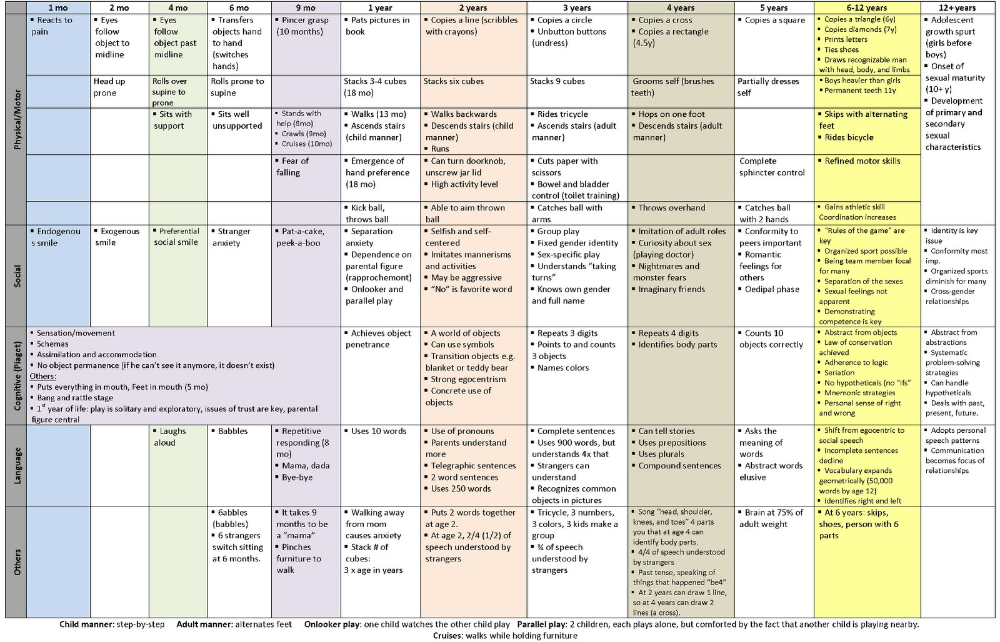As parents and caregivers, it is essential to understand the typical developmental milestones that children reach during their early years. These milestones serve as important benchmarks to assess a child's growth and development. Pediatric developmental milestones are age-specific skills and abilities that are commonly acquired by children as they go through different stages of their childhood. They encompass areas such as cognitive, motor, language, and social-emotional development. Recognizing and monitoring these milestones can help identify potential developmental delays or problems, allowing for early intervention and support when needed.
Cognitive Development
Cognitive development refers to a child's ability to think, learn, reason, and problem-solve. It encompasses their intellectual development and the acquisition of knowledge. Here are some key cognitive milestones: 0-3 months: Babies start to pay attention to faces, track moving objects with their eyes, and respond to sounds. 6-9 months: Infants show understanding of object permanence, begin to explore their environment, and use simple problem-solving skills. 12-18 months: Toddlers imitate others, point to objects when named, and show curiosity by continuously exploring their surroundings. 2-3 years: Preschoolers can follow simple instructions, engage in imaginative play, and start to understand concepts like shapes and colors. 4-5 years: Children develop a more advanced understanding of numbers, letters, and time. They engage in logical thinking and problem-solving activities.
Motor Development
Motor development refers to a child's physical abilities, including both fine and gross motor skills. Fine motor skills involve precise movements of small muscles, while gross motor skills involve larger muscle groups. Here are some important motor milestones: 0-6 months: Infants gain head control, roll over, and begin reaching and grasping objects. 9-12 months: Babies start to crawl, pull themselves up to stand, and develop a pincer grasp. 18-24 months: Toddlers can walk independently, run, kick a ball, and stack blocks. 3-4 years: Preschoolers can jump with both feet, pedal a tricycle, and use scissors. 5-6 years: Children can hop on one foot, ride a bicycle, and tie shoelaces.
Language Development
Language development involves a child's ability to understand and express spoken language. It encompasses both receptive language (understanding words and sentences) and expressive language (using words and sentences to communicate). Here are some significant language milestones: 0-12 months: Babies coo, babble, and respond to simple commands. They recognize and respond to familiar voices. 12-18 months: Toddlers say their first words, follow simple directions, and understand the names of common objects. 2-3 years: Preschoolers speak in short sentences, ask questions, and have a vocabulary of about 200-300 words. 4-5 years: Children speak clearly and with more complex sentences. They tell stories and engage in conversations. 6-7 years: Kids have a well-developed vocabulary, read and write simple stories, and understand grammar rules.
Social-Emotional Development
Social-emotional development relates to a child's ability to build relationships, understand emotions, and regulate their own feelings. It involves developing a sense of self and empathy towards others. Some important social-emotional milestones include: 0-6 months: Infants develop a bond with their caregivers, smile responsively, and show signs of happiness or distress. 6-12 months: Babies start to display stranger anxiety, imitate others' behaviors, and show preferences for specific individuals. 1-2 years: Toddlers engage in parallel play, show a range of emotions, and begin to understand simple rules and routines. 3-4 years: Preschoolers express their emotions using words, engage in cooperative play, and show empathy and concern for others. 5-6 years: Children develop stronger friendships, exhibit more independent behavior, and understand other people's perspectives.
Conclusion
Pediatric developmental milestones are invaluable tools for evaluating a child's growth and progress over time. While every child develops at their own pace, recognizing these milestones can help identify any potential areas of concern or need for further evaluation. It is important to remember that there is a range of normal development, and some variations are expected. If you have concerns about your child's development, it is always best to consult with a healthcare professional who can provide guidance and support.
